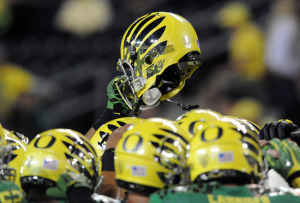 Beyond the talent of any college football team is something less visible but arguably more powerful than the line of 300 pound big uglies, sleek running backs, an all-American quarterback, and charismatic coach showing up each week to put points on the board and thrill a stadium packed with raving fans.
Beyond the talent of any college football team is something less visible but arguably more powerful than the line of 300 pound big uglies, sleek running backs, an all-American quarterback, and charismatic coach showing up each week to put points on the board and thrill a stadium packed with raving fans.
Beyond the talent is what differentiates the common from the exceptional in anything, but especially with brands. And despite what some might think, it’s not about the uniforms, or the mascot, or the color schemes, or how many plush club seats are available for high-paying boosters.
Beyond the talent are those special intangibles that can’t be taught. These include the heart, the soul, and the magic of those brands that touch us and leave their lasting mark long after the lights are off and everyone’s gone home. They are a one-of-a-kind cocktail made of ingredients unique to a blend of timing, people, and an extra dash of something not of this world. They are visionary and sustainable.
Anyone outside of the Oregon Duck football family may wonder what all the fuss is about regarding the current drama surrounding Chip Kelly’s potential flight from coaching college football to coaching in the NFL. After all, coaches come and go these days, for a variety of reasons. The era Joe Paterno symbolized, where one coach is with the same organization for his entire career, has gone the way of immediately sending players back out on the field after taking a hit to the helmet.
It’s over, and that’s just the way it is.
The same could be said for businesses and organizations. Talent aside, what keeps them in business year after year is that same cocktail of intangibles. Some call it culture. Some call it luck. The truth is, people will always come and go. What matters most for survival is the long-term vision beyond the talent that maintains the core values and principles of a brand and keeps it around despite the inevitable changes to personnel.
Certainly, the loss of key players is scary. Change is hard, and often not openly embraced, especially when a brand is riding high and gaining momentum the way the Duck brand is theses days. While the Ducks are now recognized everywhere as a powerful and respectable football team, it hasn’t always been that way. Like their baseball brethren from Boston, Duck fans suffered heartache after heartache for decades. Losing the 1995 Rosebowl to Penn State for die-hard Duck fans is right up there with losing the 1986 World Series for tried and true Red Sox believers.
It sucks to come so close and have it all slip away in an instant. The brand is compromised, if only temporarily. Questions arise. Some fans walk away. So do some players.
But the organizations survive, and continue as a new round of talent comes along to join the veterans. Another year brings with it hope for a better season than the last. The Ducks were one field goal away in November from going to their second BCS National Championship in two years. Instead, they lost to Stanford and qualified for a trip to the Fiesta Bowl playing number 5 Kansas State. It was a great game, and the Ducks once again showed the nation how good they are — and how far they and their brand of football — have come. Even Lou Holtz admitted after that game was over that the Ducks should have been in the BCS Championship game this year.
Regardless of what Chip Kelly decides to do, the Duck brand will survive. It may change slightly under new leadership, but that’s to be expected. Those same fans who sat through the dismal 70s, 80s, and 90s because they believed in Oregon and the Duck brand will still be there next fall on opening day cheering for their favorite college team. Four BCS bowl games in as many years is nothing to sneeze at.
The Ducks will prevail, beyond the talent, because they’ve worked too hard for too long to establish themselves as contenders on the national level. And because that’s just what great brands do.
